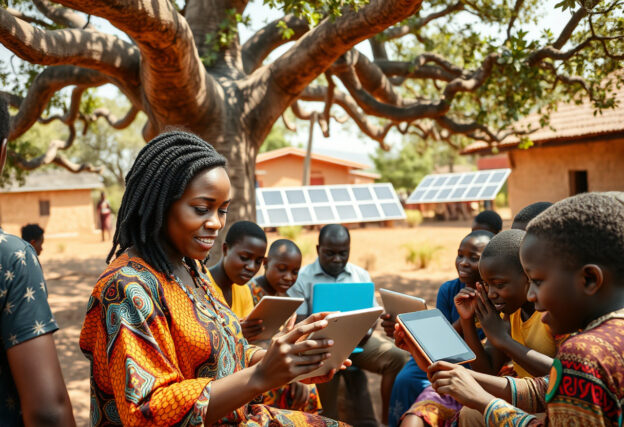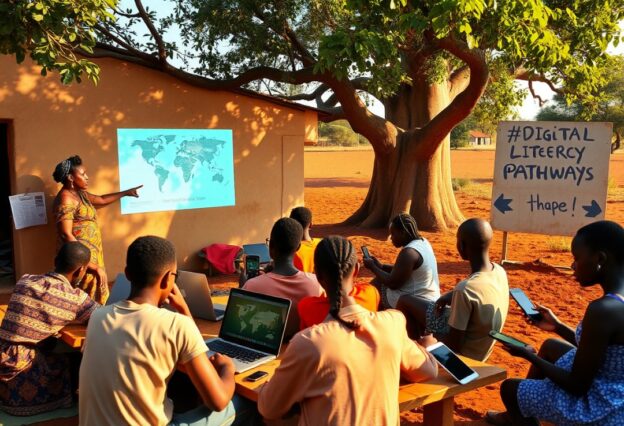PLAN OF ACTION FOR DIGITAL EDUCATION IN CAMEROON (PADEC)
Advancement in technology have continued to re-shape the planet moving every sector from analog (Manual) to digital (Automation) and the education sectors cannot be left out. Right from its inception, technology was conceived as a great tool for education, and digitizing the academic system has been proven to be a very beneficial and cost-effective way of managing and administering quality and context-driven educational services in developed countries.
BACKGROUND
The concept of Digital Education or education with technology started far back in the 1970s and 1980s, with computer-based learning by Murray Turoff and Starr Roxanne Hiltz at the New Jersey Institute of Technology, the University of Guelph in Canada
In (1973–77), the Computer Aided Learning (CAL) was termed by the UK Council for Educational Technology and was used in administering the government’s National Development Programme
Here’s a list of a number of statistics that are seen as trends in light of the current development in the field of Digital Education:
- In a comparative blasting development, corporate Digital education management has developed by a stunning 900% over the most recent 16 years.
- Also, around 77% of U.S. organizations offer web-based preparing as an approach to enhance their representative’s expert improvement.
- Digital Education has additionally prompted an expansion in income for 42% of organizations.
- 67% of associations now offer portable learning in some shape.
- 99% of portable clients trust that Digital Education has upgraded their experience.
- The Digital Education market is anticipated to be a $37.6 billion market by 2020.
- Social learning approaches have a 75:1 ROI proportion over electronic preparing.
- By 2019, the video will be in charge of 80% of the web activity on the planet.
Despite the progress made by developing countries in tailoring ICT to impact and transform the educational sector via digital education technology, developing countries in general, and Africa, in particular, suffers immensely from major setbacks in integrating technology in education. However, the introduction of information and communication technologies into the education system—which is fundamental to the knowledge economy has been a difficult struggle, and in the opinion of some researchers, far too slow.
Many have pointed out that it is not realistic to talk about education technologies in a continent where great numbers of schools have neither electricity nor internet connectivity, or where there are not schools at all. And as the results of the current situation of the African education system would appear to completely rule out the use of ICT in schools.

APPROACHES TO INTEGRATE TECHNOLOGIES IN EDUCATION IN AFRICA
According to many authors (UNESCO, 2004; Grégoire, Bracewell & Laferrière, 1996; Karsenti & Larose, 2002; Tardif, 1998), ICT in an educational context refers to a set of combined technologies that enables not only information processing but also its transmission for purposes of teaching/learning and educational policy development.
Therefore, for any solution aimed at addressing the problems of education in Cameroon as well as any developing country with the use of ICT, there must be clear-cutting policies addressing such overwhelming needs as listed above. Hence priority must be given to the following approaches:
- ICT Integration: this implies the computer equipment integration in the management and administration of education.
- Pedagogical integration: adapting and using ICT to become part and parcel of the educational application process
Lauzon Michaud and Forgette-Giroux (1991), made a clear distinction between the above two different types of ICT integration which are physical and pedagogical.
- Physical Integration Approach: This consists of making technological equipment available to teachers and students and promoting its use for occasional pedagogical needs. Physical integration is therefore understood as a process that leads to the introduction and/or deployment of technologies in the educational institution.
- Pedagogical integration Approach: With this Approach, CT in education means the appropriate, habitual and sufficiently regular use of ICT that produces a beneficial change in educational practices and improves teaching/learning (Depover & Strebelle, 1996; Isabelle, 2002). This type of integration implies the routine use of ICT in the learning process. The pedagogical integration of ICT must, therefore, be understood as integration such that the student learns and socializes through a multitude of interactive and communication channels. It cannot be reduced to mere physical integration, which is nonetheless imperative.
[os-widget path=”/iglobe/what-is-your-stand-on-digital-education-in-Cameroon”]
APPRAISAL OF ICT IN CAMEROON EDUCATION
The integration of ICT in education should not be confused with its inclusion in the school curriculum but however, nonetheless, should this aspect be ignored as it is part of the whole process by providing students and teachers with the required skills to make education with technology a success.
However, in Cameroon, there exist only the Physical Integration Approach to technology for education through the use of ICT (hardware) equipment, meanwhile, the Pedagogical Integration Approach is yet to be given food for thought.
The problems and barriers with respect to ICT integration by teachers stem from several sources: inadequate initial training, insufficient motivation, absence of technical support, a school administration that does not embrace ICT usage, lack of administrative support
According to I-GLOBE’s 2009/2010 primary survey, and the most recent one in 2016, only about 17% of schools in most urban areas in the South West region are equipped with computer labs. After carrying out a Semi-Structured Interviews (SSI) with a good number of students in some schools, it was established that 70% of graduating students from 12 Schools with Computer Labs actually complete School without ever visiting the Lab. 25% of students who use the lab know about the internet and just those with E-mail accounts use it either to send or receive mails from their loved ones. None of the above students have ever used the internet for research or educational purposes. Therefore, the overall assessment of Computer application into Cameroon schools is about less than 10%
PASSPORT TO EFFECTIVE APPLICATION OF TECHNOLOGY IN EDUCATION
Nowadays with the help of the Internet and digital divide, the social media has completely revolutionized Information and Communication Technology in the society today, but its application especially in Africa comes with negative energy which began in the early 90s with Cyber fraud/identity theft, Cyber prostitution, and cybercrimes, and now it has graduated to high profiled cyber criminology and a tool to fuel unwanted political revolution, destabilize countries, influence public/social policies and economic sabotage, which have eaten deeply in to the mentalities and hearts of our youths (both students, school dropouts and unemployed).
A typical Cameroonian, even those in rural areas as well as ethnic minorities could now boast or hoping to boast of social media connectivity. An average Cameroonian with internet connectivity will spend an average of 12 hours online sharing, chatting with friends and commenting on posts and photos. Which their fore implies, there is an energy in the social media that can speed up any action geared at digitizing educational processes in Cameroon.
[socialpoll id=”2558463″]
Hence African in general and Cameroon, in particular, must take an action to avoid this negative energy from extending to the next revolution which is the Artificial Intelligence (AI) by tapping and converting this energy to the education sector and making it useful for the development and enhancing of the education sector.
A PLAN OF ACTION FOR DIGITAL EDUCATION IN CAMEROON (PADEC), A SOLUTIONS THAT RESHAPES AND REDESIGNS A NEW VISION FOR EDUCATION IN CAMEROON
It is on this note that I-GLOBE the implementing organization, its technical partner K-LEGACY and the digital planner NA LEVEL EMPIRE, has taken the initiative to devise a solution embedded in its PLAN OF ACTION FOR DIGITAL EDUCATION IN CAMEROON (PADEC) with the following approaches:
- Digital Educational Conference (DEC) for Stakeholders Policy Formulation and Re-designing of the Pedagogical Centric Approach (DPCA) to Implement the Digital Educational Action Plan (DEAP), alongside Stakeholders, Private sectors, Civil Society and Policy makers in Cameroon. This will mark a new revolution in the Cameroon educational system.
- Connecting every School in Cameroon to the web/online with the DIGITAL ACADEMIC MANAGEMENT SYSTEM (DAMS) project that seeks to Digitize the entire Academia in Cameroon
- Academic (Teaching/Learning) Content production-based policies and standards set by the DPCA Committees under the DIGITAL EDUCATIONAL RESEARCH AND RESOURCE CENTER (DERREC)
- Organize the nationwide Computer awareness and basic computer knowledge skilled acquisition program called After School Computer Animation Project (ASCAP), that has a strategy to extend and penetrate to the rural Areas with innovation
- E-learning Technology for Education Application (ELTEA) which is a Teaching-Learning Management System (TLMS) to equilibrate access to quality education via the use of the Internet and Digital Technology in Cameroon.
However, this digital Revolution in the Education System (DRES) could bridge the Vacuum created in the education sector now for three years by the escalating Socio-Political crisis in Cameroon that has paralyzed the educational activities in other parts of the country (North and south west regions in particular), giving us the opportunity to Reshape Education and Re-design a new vision for Education In Cameroon for the benefit of all.
Literature Review/References
The concept of Digital Education by Murray Turoff and Starr Roxanne Hiltz at the New Jersey Institute of Technology, the University of Guelph in Canada
Computer-Aided Learning (CAL) UK Council for Educational Technology and the National Development Programme
ICT in an educational context (UNESCO, 2004; Grégoire, Bracewell & Laferrière, 1996; Karsenti & Larose, 2002; Tardif, 1998),
Approaches to ICT Education – Lauzon Michaud and Forgette-Giroux (1991),
Pedagogic Approach to ICT Education – (Depover & Strebelle, 1996; Isabelle, 2002)
Technology for Cameroon’s education – I-GLOBE’s 2009/2010 primary survey
Pedagogical integration of ICT – Panafrican Research Agenda (December 2006) of ICT
By KINDZEKA NESTOR
(K.N.Bibirshu)






















Responses